Experimental Study on the Seismic Performance of New Energy Dissipation Connectors in an Autoclaved Aerated Concrete Panel with Assembled Steel Frame
Abstract
:1. Introduction
2. Materials and Methods
2.1. NEDC Design
2.1.1. NEDC Structure
2.1.2. Connection Structure of AAC Wall Panel with the NEDC
2.2. Experimental Program
2.2.1. Experimental Design
2.2.2. Specimen Assembly
2.2.3. Loading Scheme and Test Equipment
3. Test Damage Form and Characteristics
3.1. Damage Mechanism of Specimen SF-1
3.2. Damage Mechanism of Specimen SF-2
3.3. Crack Distribution
4. Test Results and Analysis
4.1. Hysteresis Curves
4.2. Skeleton Curves
4.3. Characteristic Points of the Skeleton Curve
4.4. Strength Degradation
4.5. Stiffness Degradation
4.6. Ductility Coefficient
4.7. Energy Dissipation
5. Conclusions
- This study proposes an NEDC. The results show that the NEDC can adapt to large deformations between floors and improve the seismic performance of the overall structure. The effectiveness of using this NEDC has been proven through tests, which were conducted to reduce the damage caused to external AAC wall panels under earthquake action.
- Under the same conditions, the yield and ultimate load capacity of the composite frame with NEDCs was greater by 8.38%–11.65% when compared to those of the composite frame with conventional hook bolt connectors.
- For the composite frame with NEDCs, the displacement ductility coefficient was 3.34 to 3.47, the elastic limit displacement angle was θy = (3.52 to 3.62)θe, and the elastoplastic limit displacement angle was θu = 2.38θp. Thus, the NEDC led to a greater ductility of assembled steel frames when compared to that obtained using standard hook bolt connectors. Better ductility allows the structure to meet the necessary seismic design requirements.
- The energy consumption capacity of the composite frame with NEDCs is greater than that of the composite frame with conventional hook bolt connectors. The total energy consumption of assembled steel frames with NEDCs is 1.01 times higher than that observed with assembled steel frames comprising conventional hook bolt connectors. After the horizontal displacement exceeds 75 mm, the energy consumption capacity of the composite frame with NEDCs for a single cycle becomes significantly higher. AAC wall panels are a brittle building material. General connectors can easily cause damage to the wall panels during installation, making the overall performance of AAC wall panels degrade. AAC wall panels are installed in two ways: inline and outline. NEDC is the connection piece that connects the external AAC wall panel to the steel frame. In the case of an earthquake, the NEDCs reduce the effect of the seismic transverse waves by allowing the bolts to move through the transverse bolt holes in the lower part. The seismic longitudinal waves cause the bolts to move in the vertical bolt holes in the upper part of the NEDC to reduce the effect of vertical seismic waves. This achieves the purpose of reducing earthquake energy and protecting the integrity of the building. Loading is significantly higher than that obtained with hook bolt connectors. The study findings revealed that NEDCs can be used to improve the seismic performance of assembled steel structures with AAC exterior wall panels and provide improved safety.
Author Contributions
Funding
Institutional Review Board Statement
Informed Consent Statement
Data Availability Statement
Acknowledgments
Conflicts of Interest
References
- Kalpana, M.; Mohith, S. Study on autoclaved aerated concrete. Mater. Today Proc. 2020, 22, 894–896. [Google Scholar] [CrossRef]
- Cao, Z.; Du, P.; Fan, F.; Fang, M. Cyclic testing and parametric analyses of the fabricated steel frames infilled with autoclaved aerated concrete panels. Adv. Struct. Eng. 2017, 20, 1–12. [Google Scholar]
- Ding, K.; Zhang, Y. Experimental study on seismic performance of fabricated bolted joint under low-cycle reciprocating loads. Results Eng. 2021, 9, 100208. [Google Scholar] [CrossRef]
- Okazaki, T.; Nakashima, M.; Suita, K.; Matusmiya, T. Interaction between cladding and structural frame observed in a full-scale steel building test. Earthq. Eng. Struct. Dyn. 2010, 36, 35–53. [Google Scholar] [CrossRef]
- Ravichandran, S.S.; Klingner, R.E. Behavior of Steel Moment Frames with Autoclaved Aerated Concrete Infills. ACI Struct. J. 2012, 109, 83–90. [Google Scholar]
- Du, D.; Wang, S.; Li, W.; Xu, F.; Liu, W. Seismic Performance of the Pre-Fabricated Steel Frame Infilled with AAC Wall Panels and their Joint Connection: Full-Scale Shaking Table Test. J. Earthq. Tsunami 2019, 13, 1940004. [Google Scholar] [CrossRef]
- Cao, X.Y.; Shen, D.; Feng, D.C.; Wang, C.L.; Qu, Z.; Wu, G. Seismic retrofitting of existing frame buildings through externally attached sub-structures: State of the art review and future perspectives. J. Build. Eng. 2022, 57, 104904. [Google Scholar] [CrossRef]
- Bergmans, J.; Nielsen, P.; Snellings, R.; Broos, K. Recycling of autoclaved aerated concrete in floor screeds: Sulfate leaching reduction by ettringite formation. Constr. Build. Mater. 2016, 111, 9–14. [Google Scholar] [CrossRef] [Green Version]
- Zhang, G.; Xiao, W.; Chen, S.; Miao, Q.; Wu, H. Study of seismic behavior of autoclaved lightweight concrete wallboard. Ind. Build. 2016, 46, 86–92. [Google Scholar]
- Zhang, G.; Xiao, W.; Chen, B.; Lu, Q. Experimental study on aseismic performance of aerated lightweight concrete wall panel swing node. Archit. Technol. 2016, 47, 261–265. [Google Scholar]
- Getz, D.R.; Memari, A.M. Static and Cyclic Racking Performance of Autoclaved Aerated Concrete Cladding Panels. J. Archit. Eng. 2006, 12, 12–23. [Google Scholar] [CrossRef]
- Wang, B.; Wang, J.; Wang, X.; Gong, X.; Wan, H. Experimental study on seismic behavior of concrete-filled steel tubular frames with ALC wall panels. J. Build. Struct. 2013, 34, 147–153. [Google Scholar] [CrossRef]
- Özkılıç, Y. The effects of stiffener configuration on stiffened T stubs. Steel and Composite Structures. Steel Compos. Struct. 2022, 44, 475–488. [Google Scholar]
- Özkılıç, Y.O. The capacities of unstiffened T-stubs with thin plates and large bolts. J. Constr. Steel Res. 2021, 186, 106908. [Google Scholar] [CrossRef]
- Özkılıç, Y.O. The capacities of thin plated stiffened T-stubs. J. Constr. Steel Res. 2021, 186, 106912. [Google Scholar] [CrossRef]
- Özkılıç, Y.O.; Topkaya, C. The plastic and the ultimate resistance of four-bolt extended end-plate connections. J. Constr. Steel Res. 2021, 181, 106614. [Google Scholar] [CrossRef]
- Gokmen, F.; Binici, B.; Aldemir, A.; Taghipour, A.; Canbay, E. Seismic behavior of autoclaved aerated concrete low rise buildings with reinforced wall panels. Bull. Earthq. Eng. 2019, 17, 3933–3957. [Google Scholar] [CrossRef]
- Cao, X.Y.; Feng, D.C.; Li, Y. Assessment of various seismic fragility analysis approaches for structures excited by non-stationary stochastic ground motions. Mech. Syst. Signal Process. 2023, 186, 109838. [Google Scholar] [CrossRef]
- Binici, B.; Canbay, E.; Aldemir, A.; Demirel, I.O.; Uzgan, U.; Eryurtlu, Z.; Bulbul, K.; Yakut, A. Seismic behavior and improvement of autoclaved aerated concrete infill walls. Eng. Struct. 2019, 193, 68–81. [Google Scholar] [CrossRef]
- Wang, J.; Li, B. Cyclic testing of square CFST frames with ALC panel or block walls. J. Constr. Steel Res. 2017, 130, 264–279. [Google Scholar] [CrossRef]
- PRC. Code for Seismic Design of Buildings GB 50011-2010; China Building Industry Press: Beijing, China, 2010. [Google Scholar]
- PRC. Metallic Materials-Tensile Testing GB/T 228.1-2010; China Building Industry Press: Beijing, China, 2010. [Google Scholar]
- Lu, H.; Zhang, H.; Ma, K.; Wu, Q.; Jiang, L. Experimental study and numerical study on shear bearing capacity of shear key joints of reinforced concrete open-web sandwich plates. Adv. Mater. Sci. Eng. 2021, 22, 6197472. [Google Scholar] [CrossRef]
- Ding, K.; Chen, D.; Liu, Y.; Xia, S. Theoretical and experimental study on mechanical, behavior of laminated slabs with new type joints. China Civ. Eng. J. 2015, 48, 64–69. (In Chinese) [Google Scholar]
- Ding, K.; Liu, J.; Ren, J.W.; Ma, W. Dynamic Responses of Cellular Metal-Filled Steel Beam-Column Joint Under Impact Loading. J. Shanghai Jiaotong Univ. 2020, 25, 384–393. [Google Scholar] [CrossRef]
- Cao, X.Y.; Feng, D.C.; Wang, Z.; Wu, G. Parametric investigation of the assembled bolt-connected buckling-restrained brace and performance evaluation of its application into structural retrofit. J. Build. Eng. 2022, 48, 103988. [Google Scholar] [CrossRef]
- Özkılıç, Y. A new replaceable fuse for moment resisting frames: Replaceable bolted reduced beam section connections. Steel Compos. Struct. 2020, 35, 353–370. [Google Scholar]
- Özkılıç, Y.O.; Bozkurt, M.B.; Topkaya, C. Mid-spliced end-plated replaceable links for eccentrically braced frames. Eng. Struct. 2021, 237, 112225. [Google Scholar] [CrossRef]



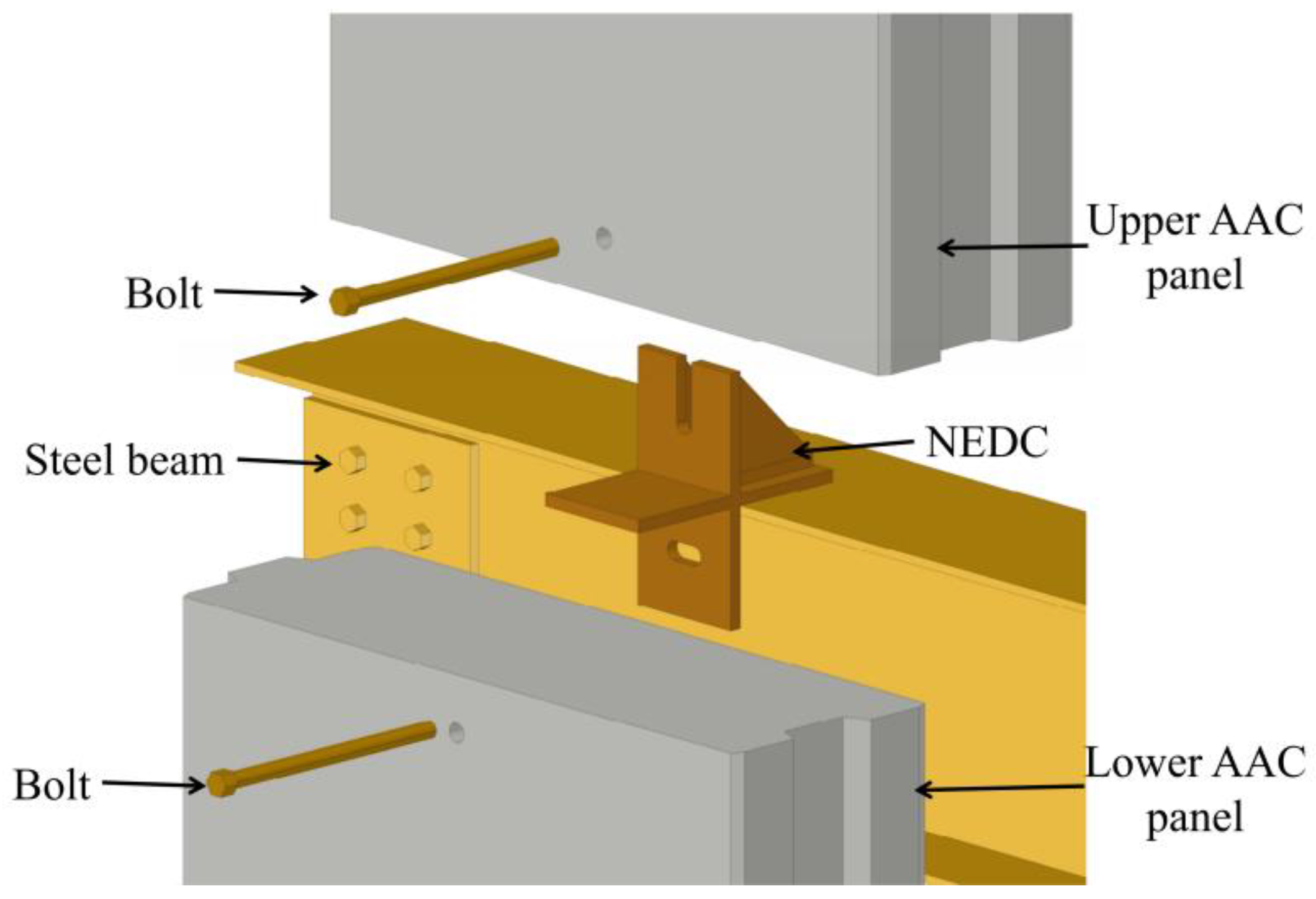
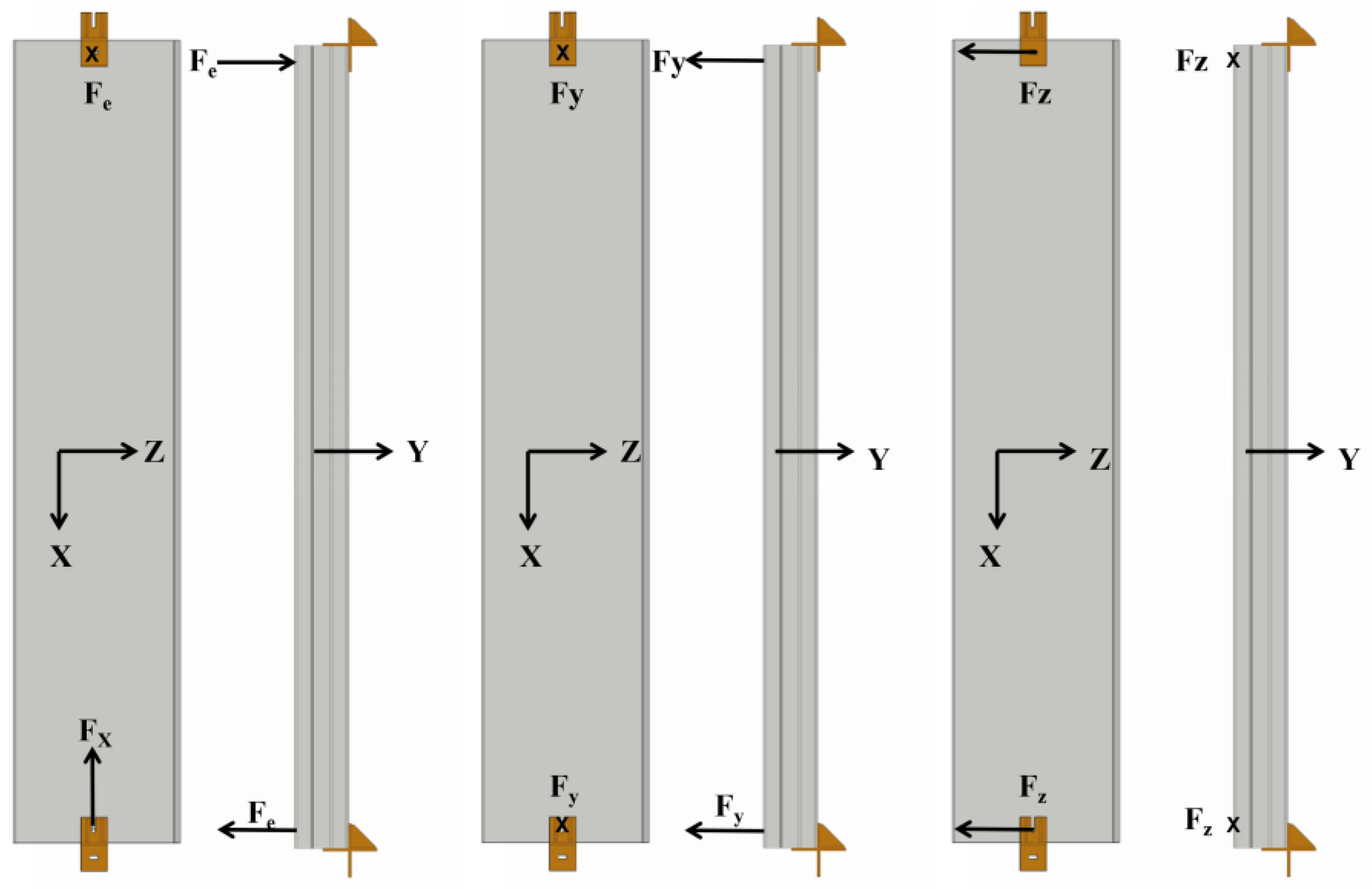

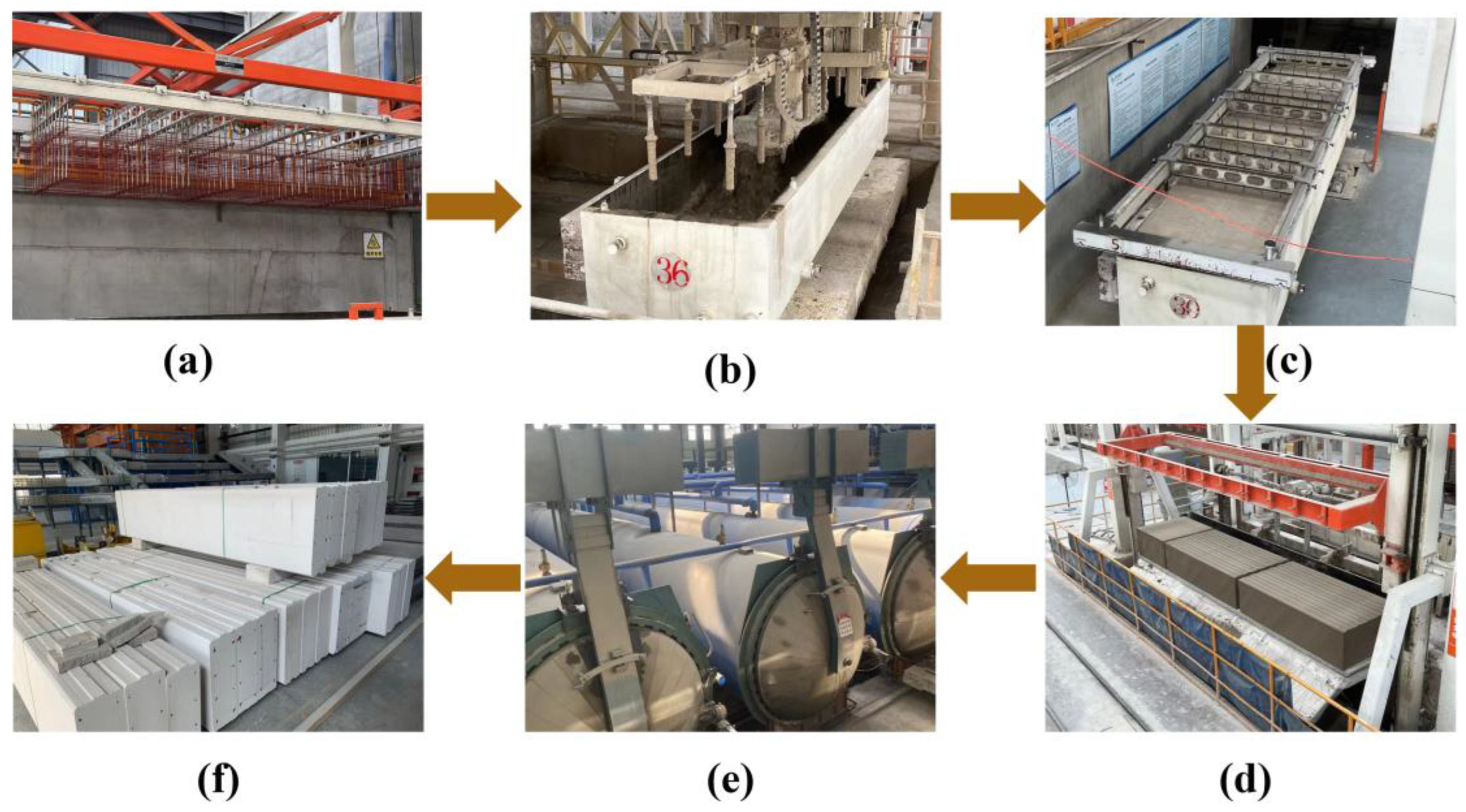

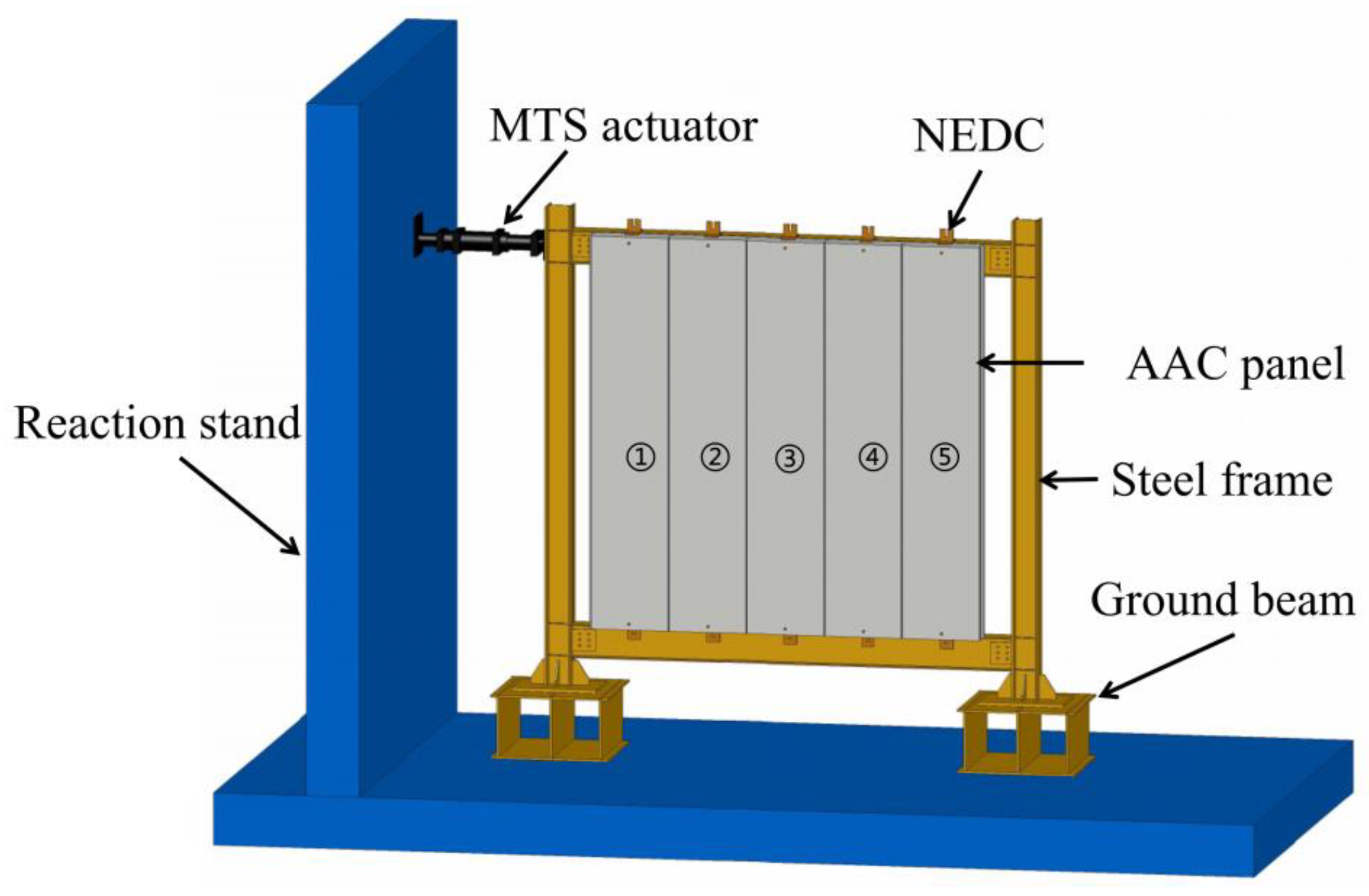



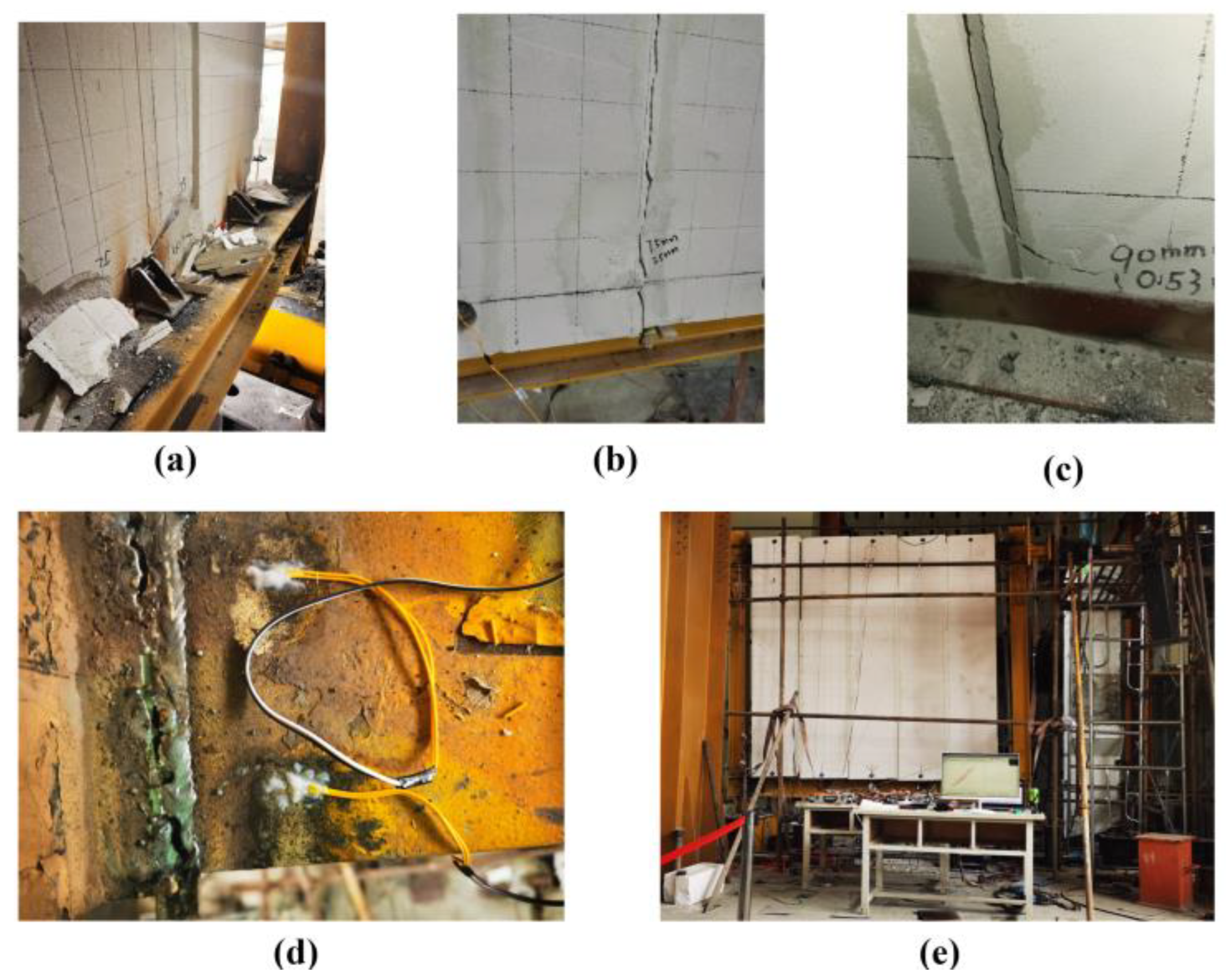

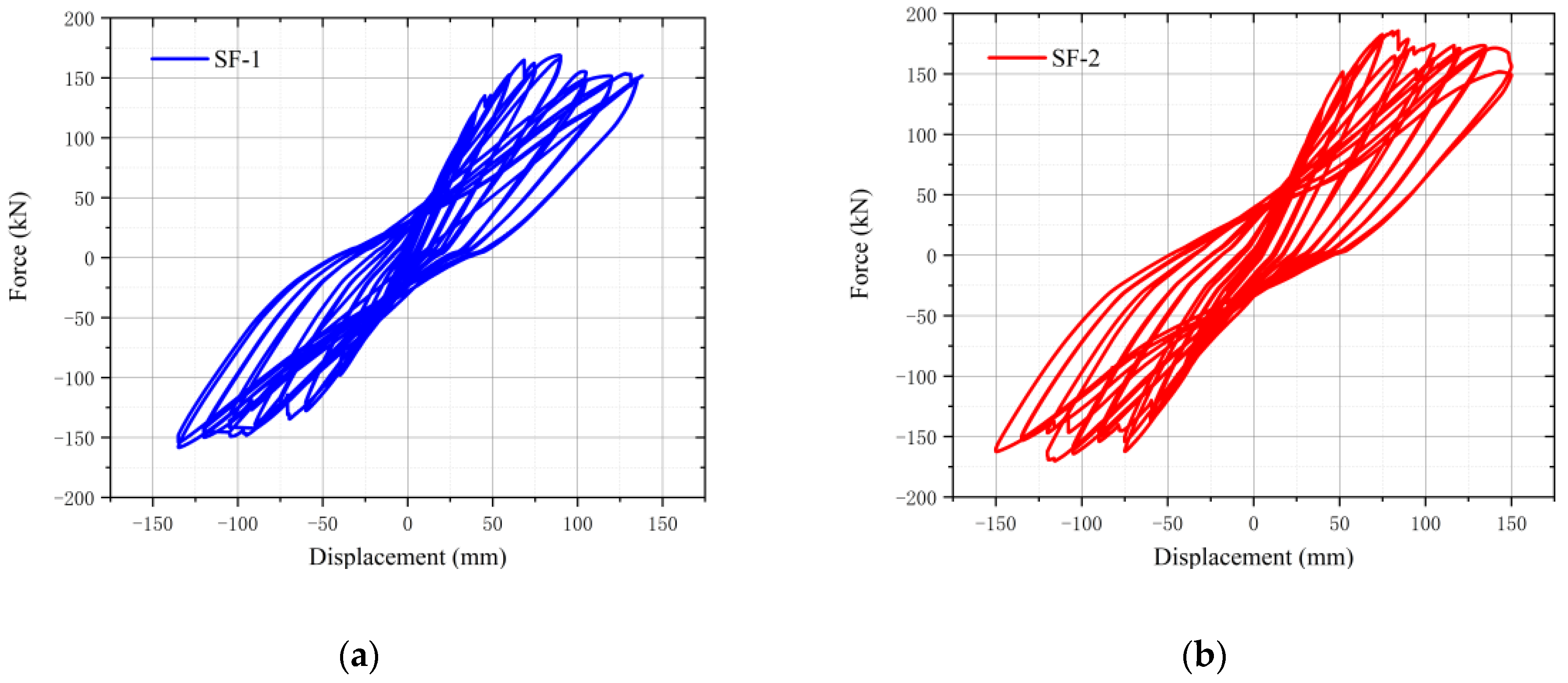
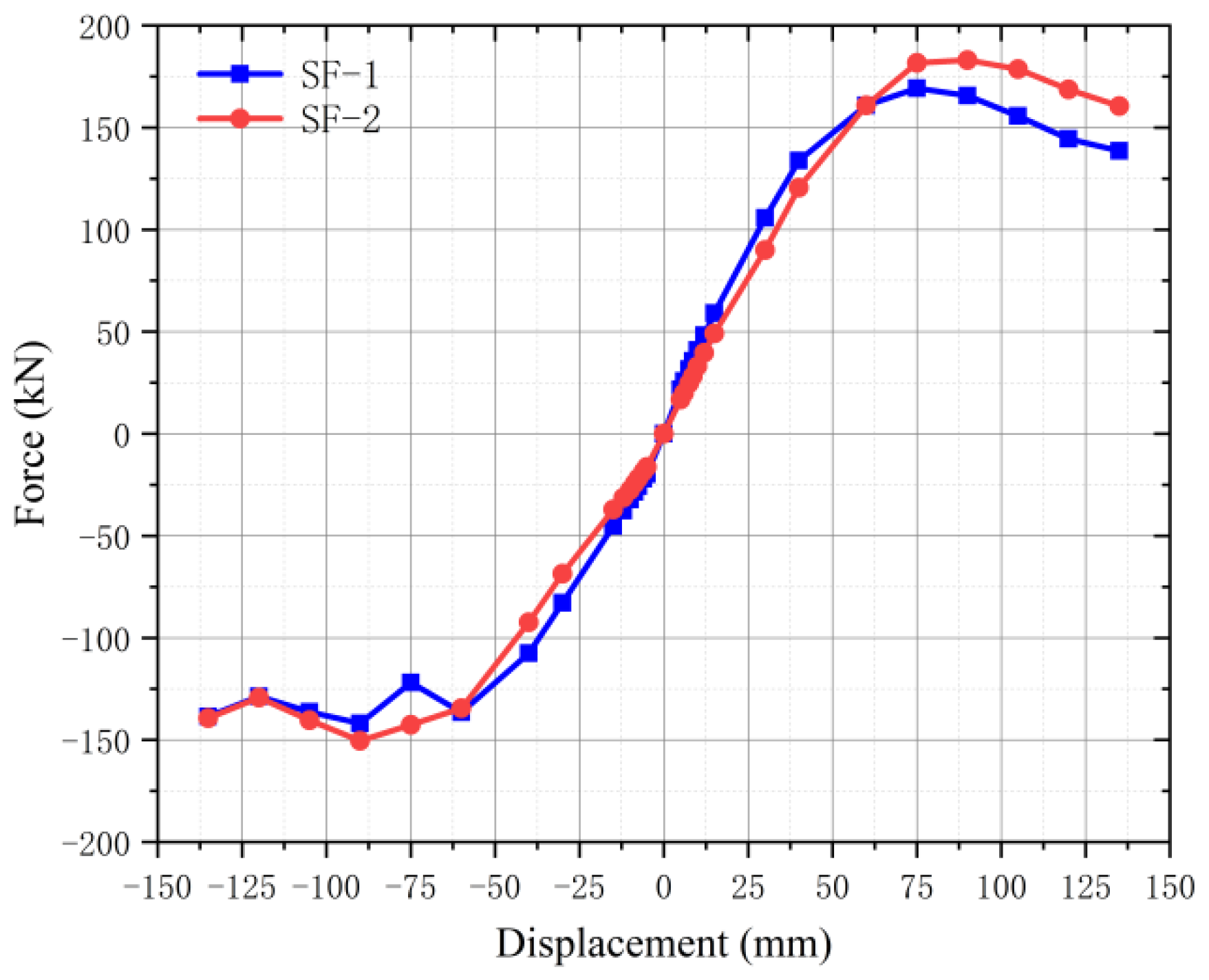
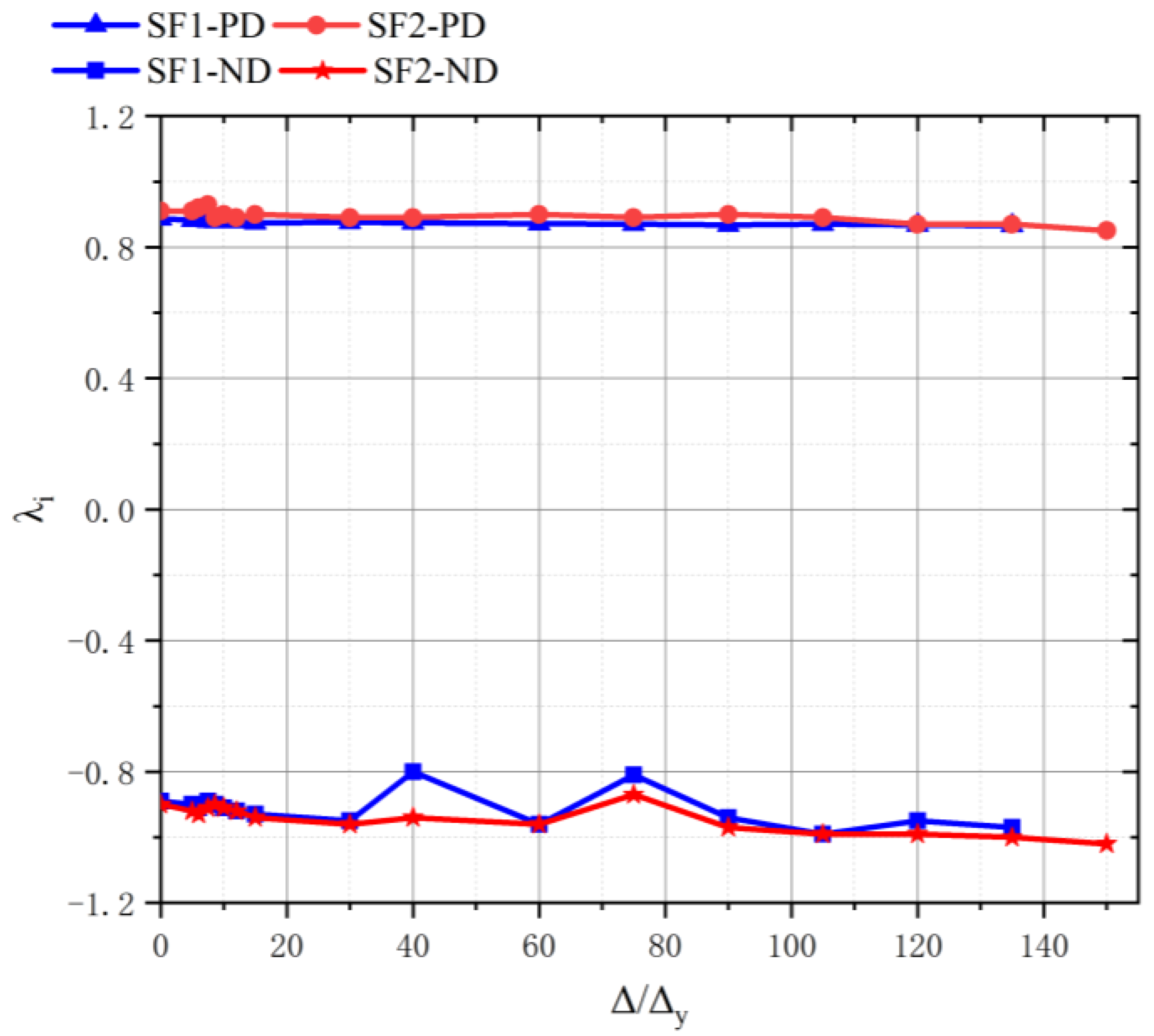

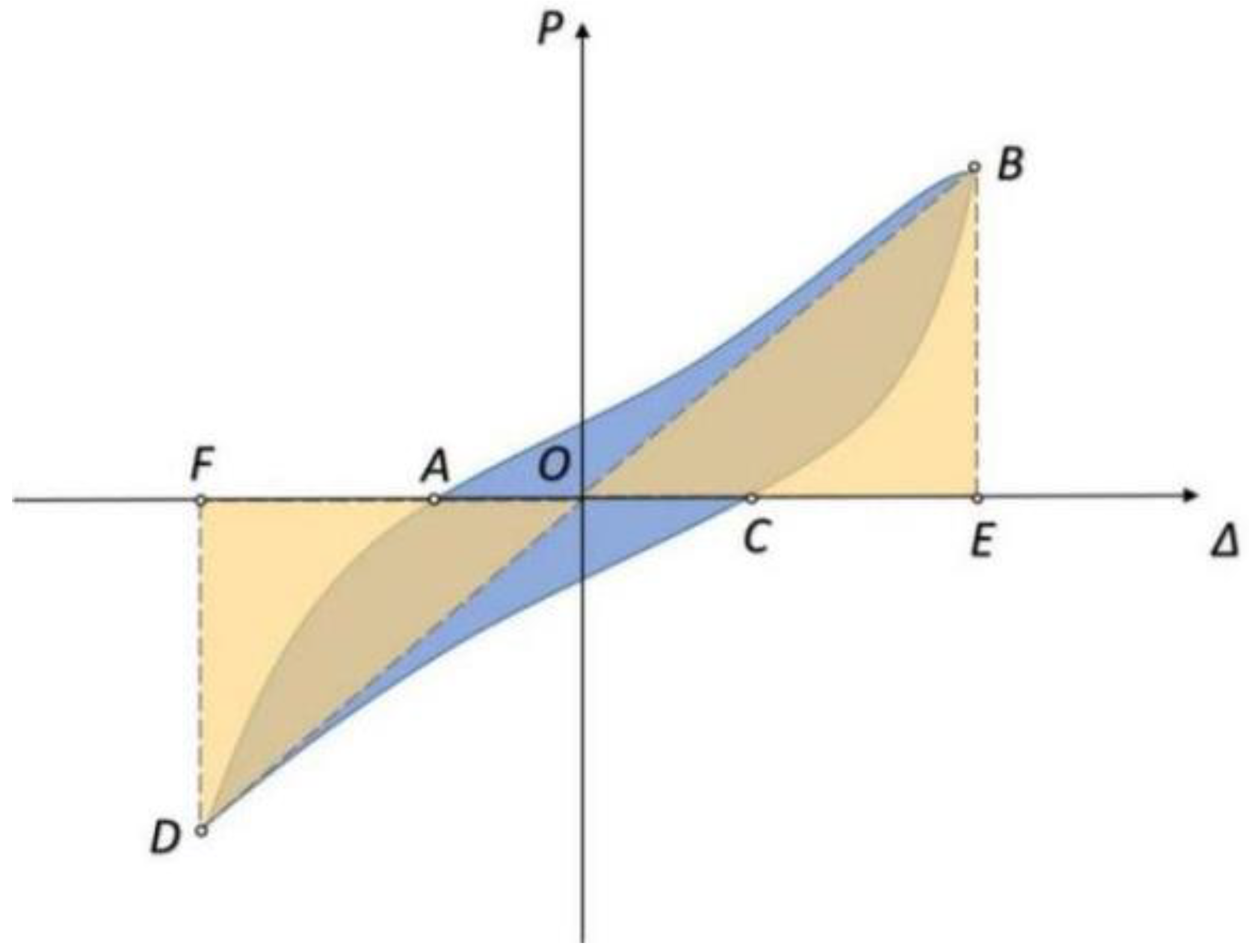

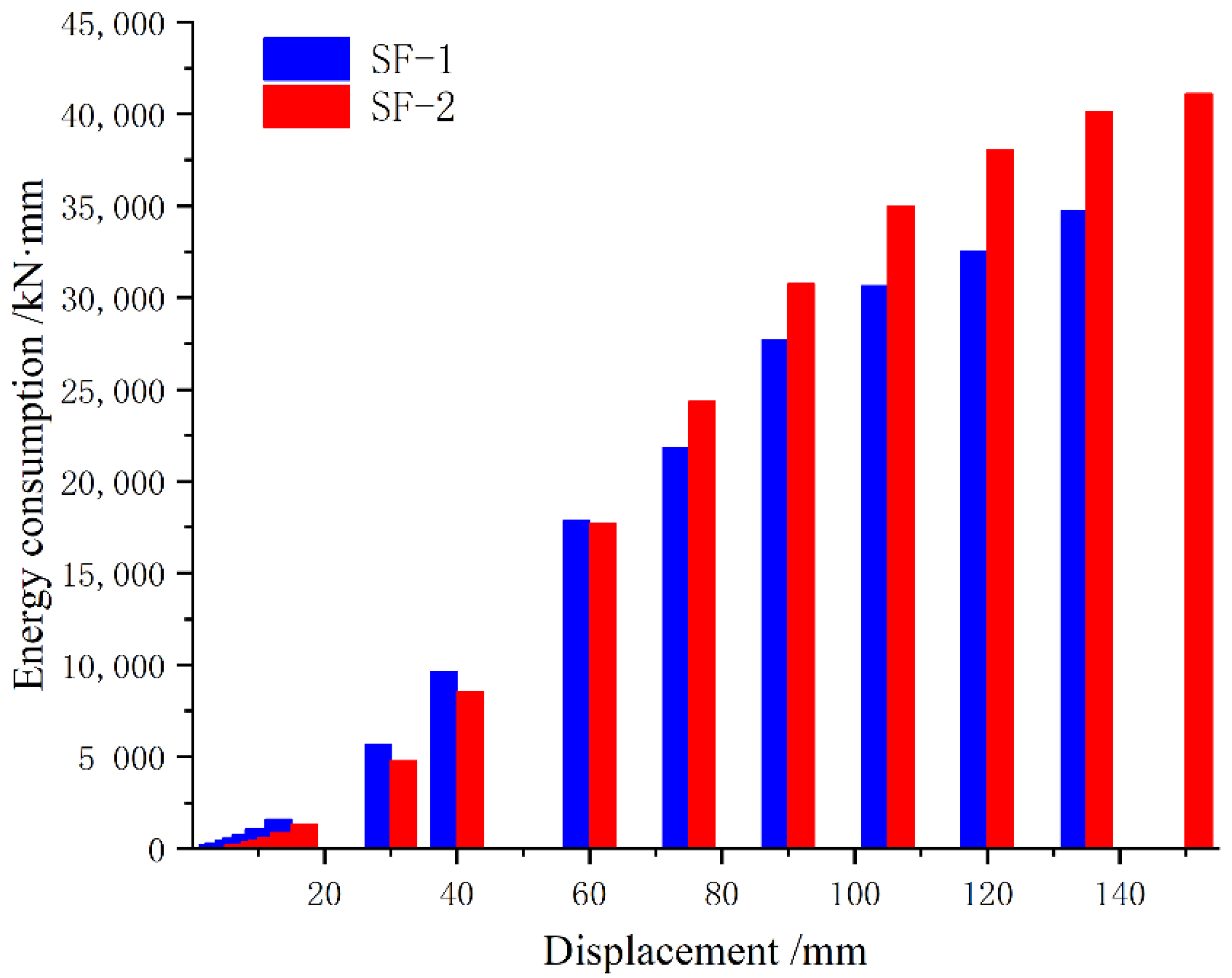
| Specimen | Connection Type | Bolt Performance Grade |
|---|---|---|
| SF-1 | Hook bolts | 8.8 |
| SF-2 | NEDC | 8.8 |
| Specimen | Sectional Dimension (mm) | Thickness (mm) | Yield Stress (N/mm²) | Ultimate Stress (N/mm²) | Elongation |
|---|---|---|---|---|---|
| Steel beam flange | HM 244 × 175 × 7 × 11 | 11 | 263.4 | 401.6 | 25.2% |
| Steel beam web | HM 244 × 175 × 7 × 11 | 7 | 275.3 | 411.3 | 22.3% |
| Steel column flange | HW 200 × 200 × 8 × 12 | 12 | 289.5 | 435.4 | 24.7% |
| Steel column web | HW 200 × 200 × 8 × 12 | 8 | 278.2 | 409.8 | 20.8% |
| Q345 | 10 | 376.6 | 510.1 | 19.6% |
| Comprehensive Strength | Dry Density | Modulus of Elasticity | Drying Shrinkage Value | Coefficient of Heat Conductivity | Freezing Resistance |
|---|---|---|---|---|---|
| 3.5 MPa | 508 kg/m³ | 1700 MPa | 0.33 mm/m | 0.128 W/(m·K) | 3.6 MPa |
| Specimens | Direction | Py.t/kN | Δy.t/mm | Pm.t/kN | Δm.t/mm | Pf.t/kN | Δf.t/mm |
|---|---|---|---|---|---|---|---|
| SF-1 | (+) | 131.97 | 39.53 | 169.19 | 75.35 | 143.81 | 121.51 |
| (−) | 110.71 | 42.41 | 141.94 | 90.35 | 120.65 | 120.34 | |
| SF-2 | (+) | 143.03 | 42.19 | 183.37 | 89.69 | 155.87 | 146.23 |
| (−) | 123.61 | 43.37 | 158.47 | 90.68 | 134.69 | 145.21 |
| Specimen | Direction | Δy/mm | Δu/mm | θy | θu | μ |
|---|---|---|---|---|---|---|
| SF-1 | + | 39.53 | 121.51 | 1/76 | 1/25 | 3.07 |
| − | 42.41 | 120.34 | 1/71 | 1/25 | 2.84 | |
| SF-2 | + | 42.19 | 146.23 | 1/71 | 1/21 | 3.47 |
| − | 43.37 | 145.21 | 1/69 | 1/21 | 3.34 |
| Specimen | Displacement | Total Energy Consumption | Energy Consumption Factor | Equivalent Damping Factor |
|---|---|---|---|---|
| SF-1 | 120 | 79,879.92 | 0.628133 | 0.09997 |
| SF-2 | 150 | 160,672.392 | 0.718837 | 0.114406 |
Publisher’s Note: MDPI stays neutral with regard to jurisdictional claims in published maps and institutional affiliations. |
© 2022 by the authors. Licensee MDPI, Basel, Switzerland. This article is an open access article distributed under the terms and conditions of the Creative Commons Attribution (CC BY) license (https://creativecommons.org/licenses/by/4.0/).
Share and Cite
Wang, K.; Ding, K.; Yang, T. Experimental Study on the Seismic Performance of New Energy Dissipation Connectors in an Autoclaved Aerated Concrete Panel with Assembled Steel Frame. Appl. Sci. 2022, 12, 13035. https://doi.org/10.3390/app122413035
Wang K, Ding K, Yang T. Experimental Study on the Seismic Performance of New Energy Dissipation Connectors in an Autoclaved Aerated Concrete Panel with Assembled Steel Frame. Applied Sciences. 2022; 12(24):13035. https://doi.org/10.3390/app122413035
Chicago/Turabian StyleWang, Kaili, Kewei Ding, and Tian Yang. 2022. "Experimental Study on the Seismic Performance of New Energy Dissipation Connectors in an Autoclaved Aerated Concrete Panel with Assembled Steel Frame" Applied Sciences 12, no. 24: 13035. https://doi.org/10.3390/app122413035
APA StyleWang, K., Ding, K., & Yang, T. (2022). Experimental Study on the Seismic Performance of New Energy Dissipation Connectors in an Autoclaved Aerated Concrete Panel with Assembled Steel Frame. Applied Sciences, 12(24), 13035. https://doi.org/10.3390/app122413035





